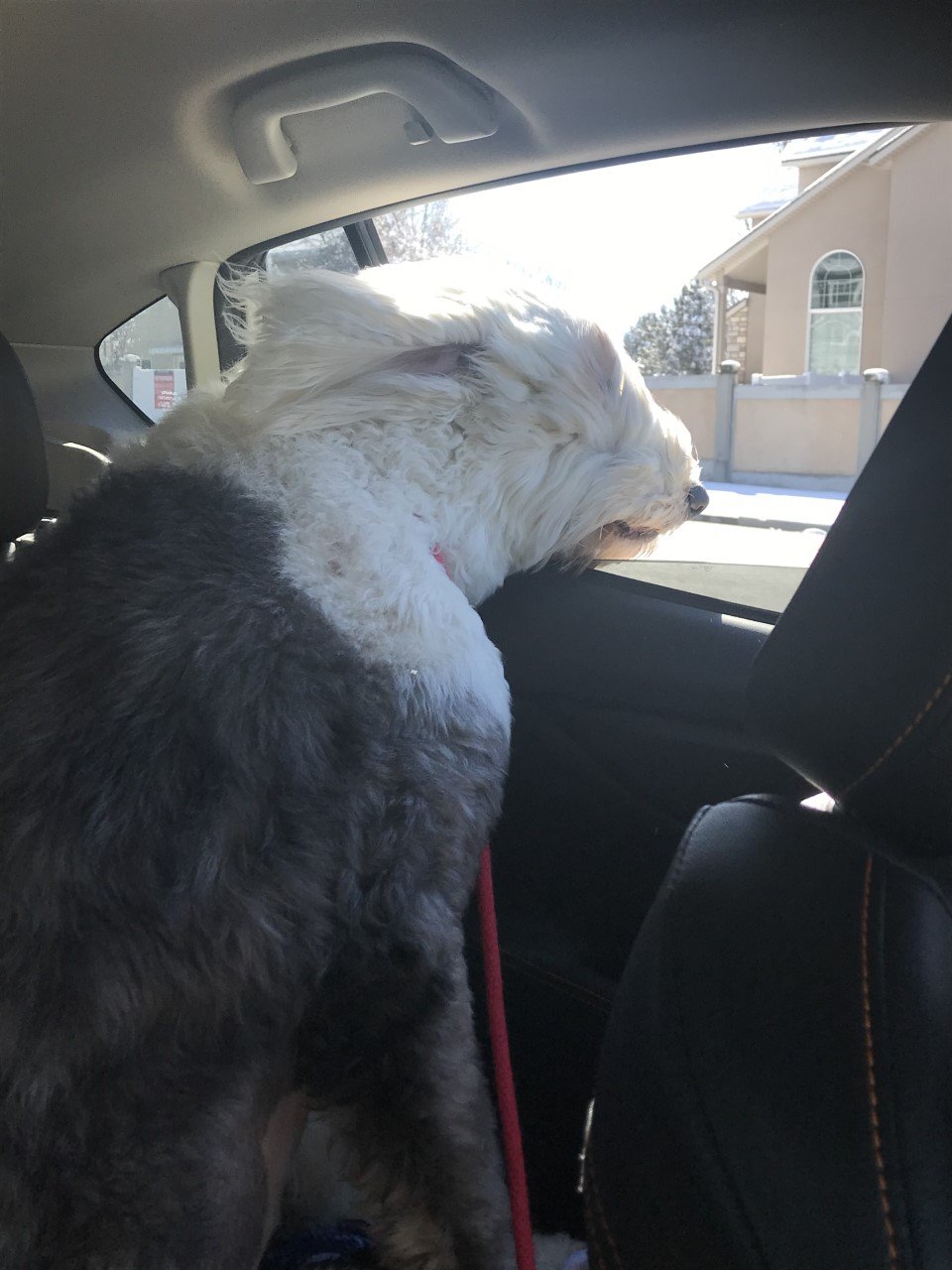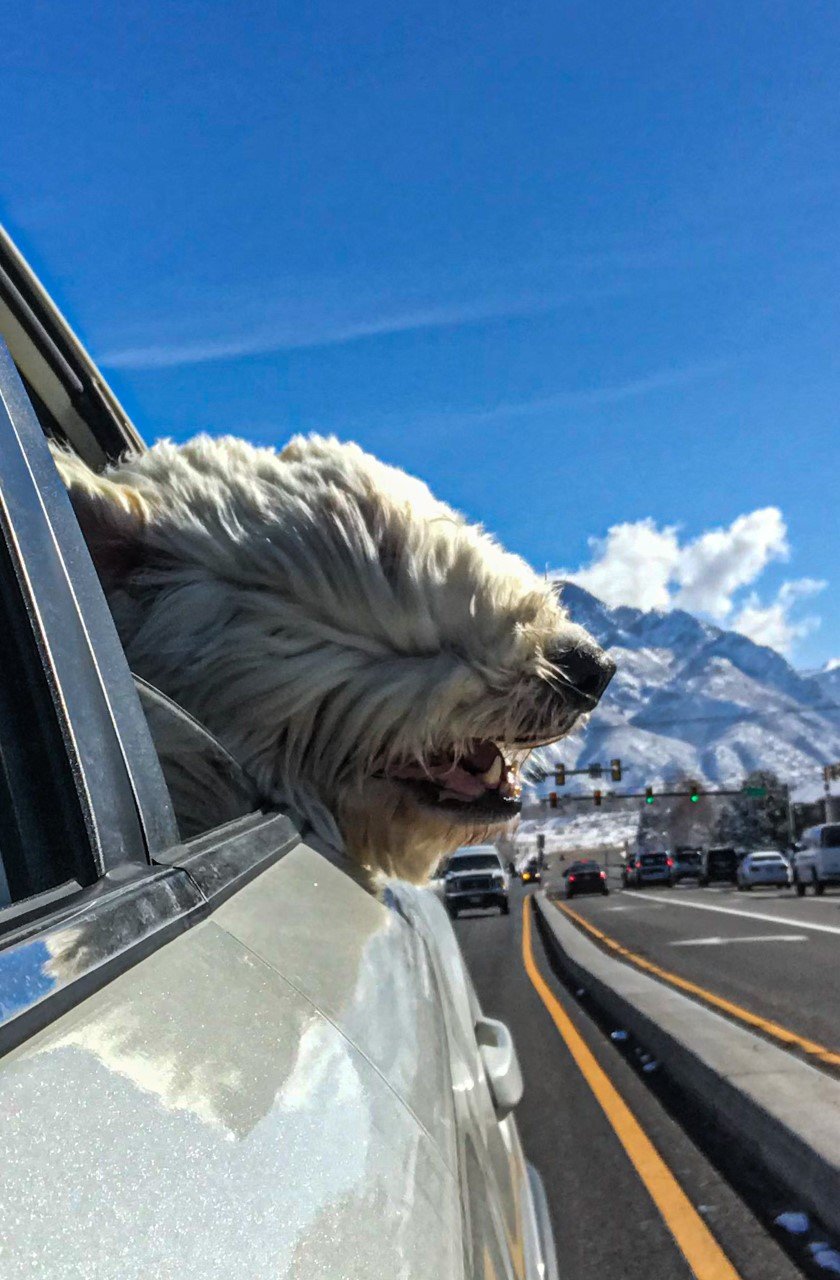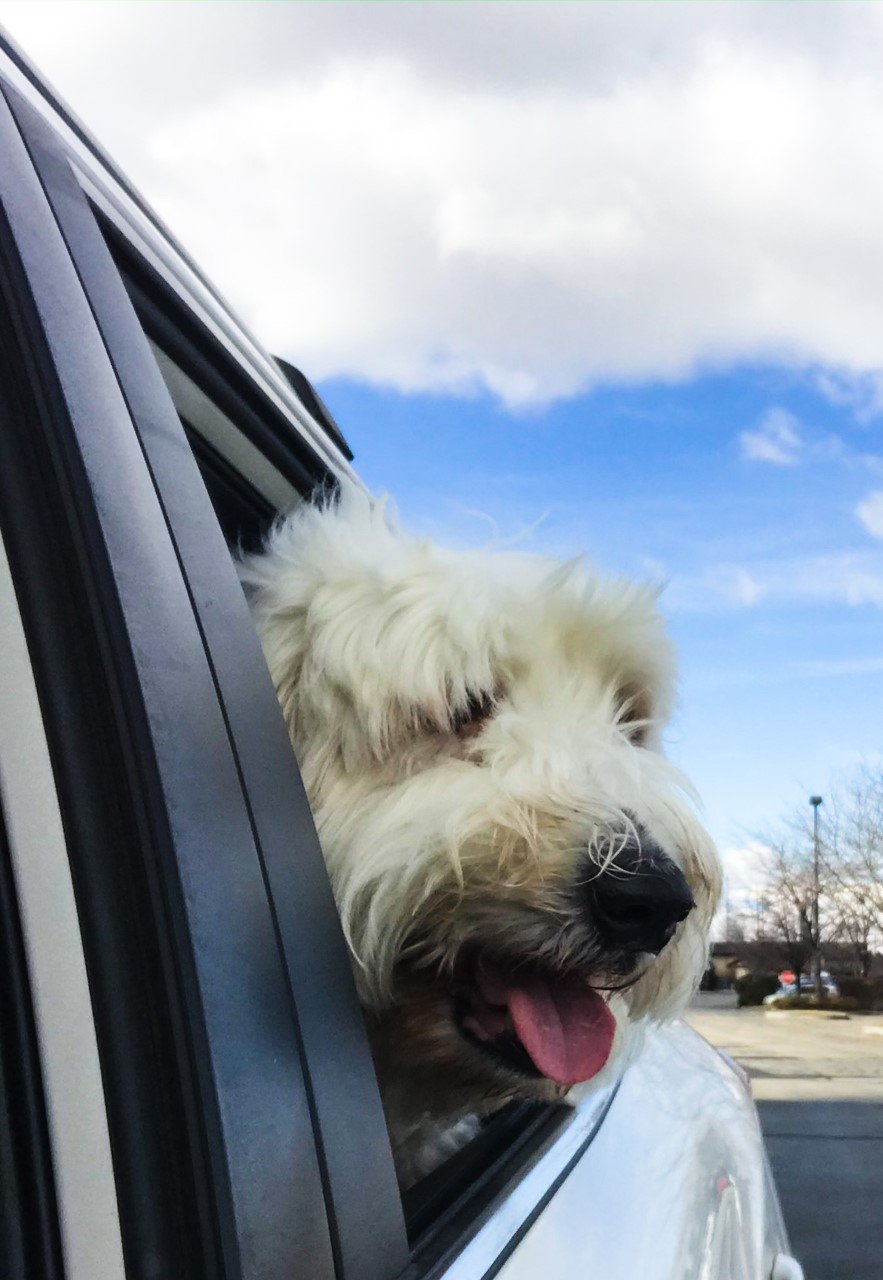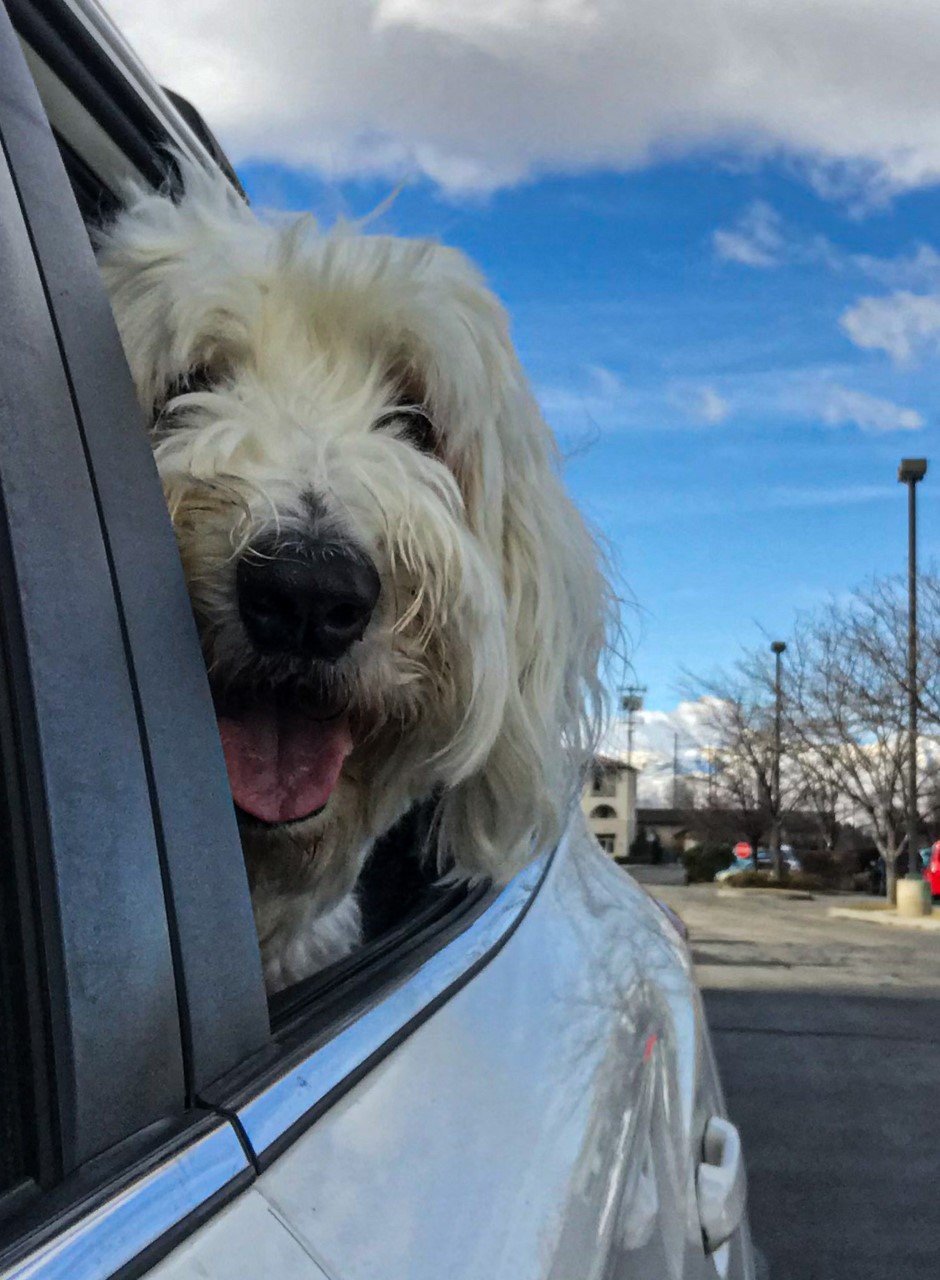Too Soon, Too Fast
December 2019
Two sons in college, Parke, a Senior at Pepperdine University in California, Duke a Sophomore at the University of Utah, a third son, Redmond a 14-year-old eighth-grader, and John, our 6-year-old Old English Sheepdog all made life rich and full.
The older boys came home for Christmas that year (as they always do). We enjoyed spending time with friends, family, and each other. And, John, who was his usual watchful, sweet, flatulent self.
When the holidays ended, Parke and Duke hugged their dad, Redmond, me – and John – and returned to their respective schools and apartments.
January 2020
News about a mysterious virus originating in Wuhan, China, was beginning to crescendo and moderately capture our collective attention. Other than that, the month came and went.
Early February 2020
I noticed John, our Sheepdog, looked thinner – not to be confused with thin. At 130 pounds, it was difficult for John to not look thick. I mentioned something to my husband, Chris, who shared that he’d noticed John hadn’t been eating all his food. The more we observed him, it was clear John wasn’t himself. Feeling guilt for not noticing sooner, but not overly concerned, we took John to the vet.
Our week began with mild concern, and evolved to multiple tests – bloodwork, ultrasounds, and biopsies. On Saturday, February 15, we received John’s diagnosis. Lymphoma. We were devastated.
We decided to forego chemotherapy, make John as comfortable as possible and prepare for the inevitable. Two months, the vet said. But, who knows? The vet prescribed medication to help with John’s pain, energy level, and appetite loss. We gave him anything he wanted to eat, which wasn’t much. Yogurt, chicken, rice, bacon, peanut butter, cheese, and his favorite – potato chips.
A week into John’s diagnosis he began to have trouble defecating and to bleed rectally. We were certain it was evidence that the end was near.
We called our sons, Parke and Duke, and encouraged them to come home if they wanted to see John one more time.
Friday, February 28, 2020
Parke was on a flight from California scheduled to arrive at 11 PM. Earlier that same evening, the situation with John’s backside worsened. Chris discovered a bloody mess in the bathroom where John had been resting. We feared it was the end, but hoped John would hold on until Parke’s plane landed and Duke could join us.
Chris took John to the emergency vet clinic; I went to the airport to pick-up Parke.
When Parke and I arrived at the clinic, John was still waiting to be seen. He didn’t look that bad and was happy to see us. The high dose of prednisone he was on took us on rides towards hope, only to send us back to the reality of John’s looming departure.
A technician finally called John’s name. She disappeared with him while we nervously waited.
The vet came to meet with us; we braced for the bad news. But all for naught. John had a large anal abscess that had been leaking and finally ruptured. Gross – and painful for him – but not life-threatening, and not related to his lymphoma.
We were sent home with more medications and instructions on how to care for John’s very irritated rear. A routine that Chris called “John’s butt spa” because it involved a 10-minute long warm, wet compress, and applying salve to an uncomfortably compliant Sheepdog, multiple times a day
“It’s time for John’s butt spa,” Chris would say as he snapped on his latex gloves and grabbed the clean, white washcloth he’d presoaked in warm water. Chris’ dedication to the treatment, and John’s surrender to it was an oddly tender scene. John laying on the floor, Chris sitting on the floor at the stern, his hand squarely on John’s butt. Both quiet, but seemingly content to be together.
The weekend was peaceful. John received three daily butt treatments and enjoyed lounging amongst the boys as they visited with each other and played video games in the family room. John moved slower, still struggled to poop, urinated frequently because of the prednisone --which caused him to have accidents in the house for the first time ever – and ate portions of his special meals. The boys gave him time, attention, and abundant gentle touch.
The boys and John - last weekend together.
John had always slept on Parke’s bed when Parke was home. For the first time, Parke said goodnight to John each night, and John, somewhat confused, yet simultaneously seeming to understand, settled in for the evenings in our master bathroom. The rectal bleeding and more frequently occurring accidents made it practical for us to place a bed for John where clean-up was easy.
Sunday, March 1, 2020
The moments of the weekend were slow, but Sunday afternoon arrived quickly. Parke was returning to college knowing John would be gone the next time he returned home. Before heading to the airport, Parke and John loved on one another while the rest of us toggled between looking away and watching. As Chris pulled out of the garage and headed down the driveway with Parke in the front passenger seat, John and I stood in the garage doorway, me waving, John watching, ears perked until they were out of site. A routine scene.
When Chris got back from the airport, Duke had returned to his apartment in Salt Lake City with a less painful goodbye with John because he was close enough to visit whenever he wanted, Redmond was in his room, John was resting in the kitchen near the garage door, and I was puttering. About an hour later, I heard some thudding noises and whimpering coming from where John had been resting. I quickly investigated and found John in the midst of a grand mal seizure. I called for Chris.
There wasn’t much to do except watch and whimper myself. We made sure John was breathing and that his large body was no longer hitting the wall or cabinets.
Chris called the vet who stayed on the phone with us until the seizure ended. She told us what to do and what to watch for. John slowly recovered and regained his ability to stand and walk. We decided to take him in the following morning instead of heading to an emergency vet clinic that night. John was clearly exhausted.
Monday, March 2, 2020
Our appointment was at 9 AM. The vet shared tears with us as she confirmed the lymphoma had likely spread to John’s brain. She prescribed anti-seizure medication and sent us on our way. We had an emergency dose of something that would stop a grand mal seizure if it continued for longer than five minutes. The vet said the routine anti-seizure medication should help, but depending on what was happening in John’s brain, a lengthy life-ending seizure would be traumatic for everyone. Especially with a 130-pound Sheepdog.
John loved his ride home from the vet. He seemed so normal and happy. He was majestic, beautiful, and oh so sweet. His imminent death, which we thought would be several weeks away, was a bizarre and surreal thought. And, naturally, unbearable.
Redmond was at school when we arrived home. Chris and I got John settled, gave him all his medications and a butt spa, then I went to the office. Chris works from home, thankfully, and called me a few hours later. John had had another seizure. We let the vet know. She increased the anti-seizure medication dose.
Tuesday, March 3, 2020
I went to work Tuesday morning. Chris was texting me John’s status. He ate a little but seemed increasingly confused. He was moving slower, his rest wasn’t restful, his breathing was shallow, and he struggled to go to the bathroom. He didn’t have another seizure, but I worried the heavy anti-seizure medication might be creating miserable side effects. I called the vet. She said it was our choice, but we risked an end-of-life seizure if we skipped the next dose. Dosing time was specific and imperative to effectively halt seizures.
We skipped John’s mid-day dose. Nothing changed. His confusion and apparent discomfort continued and worsened.
As the afternoon turned into the evening, it was clear to us that John’s suffering couldn’t continue. We watched the clock knowing a seizure was nearing since we’d skipped a dose. And, we were unable to get any meds in him.
We texted the older boys and said we were heading to an emergency vet clinic. It was time for us to help John pass.
Parke, our son in California, chimed in with all the expected words. But we didn’t hear from Duke, our son who lived locally. We wanted to give him the opportunity to join us with John if he wanted.
We talked with Redmond, 14-years-old at the time, already showered and in pajamas for the evening, and told him there was no right or wrong. It was his choice whether he wanted to be there when John passed.
Redmond didn’t say anything, but he disappeared upstairs to his room. A few minutes later, he returned to the family room where John was laying, having changed from his pajamas into jeans and a t-shirt.
Together, the three of us maneuvered a slow-moving, quiet, confused John to the backseat of our lowest-to-the-ground vehicle. His body consumed the entire back seat. Redmond sat in the front with Chris. I drove a separate vehicle.
The whole scene felt unreal. John was only 6-years-old; a few weeks ago, he seemed fine. He was too young. We weren’t ready. And, not like this.
We arrived at the clinic in tandem. I ran in, the waiting room had sad people with sick and injured pets. I envied their hopeful outcomes.
Unable to talk without crying, I walked behind the counter and motioned for someone to come closer.
“I called earlier. We have a 130-pound Sheepdog in the car. We’re here to help him pass. But, we need help getting him in.”
The young man I spoke to told me there was a side door we could use to enter with John. He said that he and another technician would meet us by our cars with a gurney.
“He’s big,” I said. “Like, human big.”
The two young men joined Chris, Redmond, and me in the parking lot with a gurney that looked much too small. The back doors of the car were opened, John calmly lying there, sweetly looking at us, but making no effort to move. Not in his typical Sheepdog-mule way, but in a way that conveyed his exhaustion and near-death condition. The technicians were clearly moved by his size and beauty and stroked his ears softly as they transferred him from the car to the gurney. They managed to work together, lifting a dying dog in front of a grieving family in a graceful way. A large, limp dog, who’s body consumed every bit of the gurney surface, somehow without a paw or a leg spilling over. It was as dignified as it could be.
We followed John and the technicians into the building through the side door and entered a small examination room. The technicians left, leaving Chris, Redmond, and me with John in the room. The three of us cried and petted John in our own worlds of disbelief and grief. The room was bright and sterile.
A female nurse entered to confirm that we weren’t there for treatment, but for end-of-life assistance. She said they’d need to take John to insert an IV so the vet could administer the drug. As she wheeled him out, another young female assistant entered the room.
In a soft almost whisper of a voice, she began to ask us questions. Did we want the body? A paw print? Some fur? I knew Chris and I were thinking the same thing so I told her our preference was cremation and his ashes could be delivered in the simplest receptacle. We intended to spread them.
She had a terrible job. But she approached it maturely and completed her paperwork. She expressed her sympathy before leaving the room, promising to return with another box of tissue. Which she did.
It was only 20 minutes, but it seemed like hours before a technician wheeled John back into the room. It didn’t look like he had moved, although they told us they’d weighed him. The IV was in his right, front leg.
We quietly touched and kissed John, one of us occasionally saying, “I can’t believe it,” “This doesn’t seem real,” “John.” I’d been texting Parke and Duke updates. Duke hadn’t responded, and we hated to move forward without giving him the option to be there.
Finally, the vet entered our room. She apologized for our wait, confirmed our reason for being there and validated our decision. She then explained the process. She would administer the drug through John’s IV, his death would be calm and quick, there would be no turning back, and his eyes might remain open. Did we still want to be in the room? Yes. Even Redmond sadly nodded yes.
The vet left to get the lethal dose of medication. In the meantime, Duke had texted. He’d been in a movie theater, his phone off. We all agreed it was best to not delay. We’d waited a long time and John was ready.
It was fast and surreal. The vet returned with a large syringe. She stood on John’s right side by his head. Redmond, Chris, and I lined up on John’s left side. Redmond by John’s head, then me, then Chris.
“Are you ready?” the vet calmly asked. We all three nodded. And sobbed. Redmond gently stroked John’s head, placing his face near John’s. I had my hand on John’s body, as did Chris. The snot and tears flowed.
The syringe emptied, John closed his eyes, and within a moment it was over. The vet looked at us and softly said, “He’s gone.” We nodded, unable to speak. She said we could have some time with him and left us alone.
The too-bright, sterile room, our lifeless John, an unbelievably brave 14-year-old boy, and two shamelessly grieving parents who didn’t know what to say or do is a raw memory. We all kissed John, felt him, smelled him. I wailed internally, “Bring him back.” I began questioning everything. Did we do the right thing? Should Redmond have been there? Should we have waited until the next morning? Should we have waited for Duke?
Once we were finished, I opened the door and let someone know we were ready. A technician arrived; we all gave John one more goodbye kiss on the head and watched as he was wheeled out of the room.
As we exited the building, crying, in disbelief and shock, Chris said to Redmond, “It doesn’t get any harder than that.”
**********
In the following two weeks, the WHO declared Covid-19 a pandemic, Chris drove to California to help Parke move home from Pepperdine, and Duke was tossed out of bed during a 5.7 magnitude earthquake. Within short-order, we were all living under the same roof, discussing the evolving global health crisis, and avoiding talking about John, but all of us painfully aware of his absence.
The months passed, summer was well underway, and we were settled into a routine of family dinners, puzzles, games, and masked grocery store runs.
I got the mail one day in July. There was a large heavy box. I had no idea what it could be. Then I saw the writing, “John Ross.”
John’s still in that box in our garage. We’ll spread his ashes in the backyard someday. When we’re ready.




